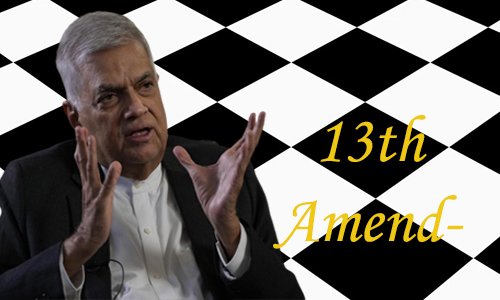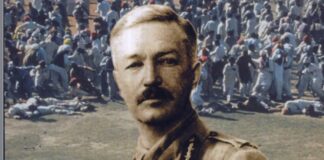- The writer examines the background and the impediments on the way to fully implementing 13A.
Is all the effort that Ranil Wickremesinghe is putting in to implementing the 13th Amendment to the Constitution for real, or is it a red herring?
Political circles were buzzing with this question as Wickremesinghe took the time and effort to brief Parliament last week about why he thinks the controversial amendment which gave rise to provincial councils should be implemented in its entirety.
It has to be acknowledged that it was a through articulation of the argument. That is understandable because Wickremesinghe was a member of the Cabinet that approved the 13th Amendment under duress after then Indian Prime Minister Rajiv Gandhi air-dropped ‘parippu’ to the North and sent a strong message to the government in Colombo headed by then President J.R. Jayewardene.
Wickremesinghe it was who also spearheaded ‘peace talks’ and a ‘ceasefire’ with the Liberation Tigers of Tamil Eelam (LTTE) when he was Prime Minister from 2001 to 2004 and was on the cusp of offering greater devolution than provincial councils, when the talks fell through. This was to cost him politically as he was marketed to the electorate by Mahinda Rajapaksa’s campaign managers a year later as the person who tried to hand over the North and East to the LTTE.
With such hindsight, Wickremesinghe is very aware of the pathways and pitfalls of devolution. Now an accidental President, he claims he wants to “fully implement” the 13th Amendment which, as Sri Lanka Podujana Peramuna (SLPP) General Secretary Sagara Kariyawasam pointed out, is a task that no elected President before him has dared to take on, despite having a mandate from the public- which Wickremesinghe doesn’t.
The full implementation of the 13th Amendment entails several contentious issues, among them devolving authority over land and the grant of Police powers to the regions. Given the country’s experiences with the LTTE, there is naturally reluctance, apprehension and fear in the South of the country that conceding these vital functions to the provinces could pave the way for separation. Hence the opposition to the 13th Amendment, whether it is reasonable or not in a country which is now in its fourteenth post-war year.
Nevertheless, Wickremesinghe’s argument is simplistic to the point of being naïve. The 13th Amendment is in the Constitution, he says, so it must be implemented or else, it must be removed from the Constitution.
Wickremesinghe’s initial foray into implementing the 13th Amendment came just before his visit to India. That was when he met representatives from Tamil political parties for discussions regarding the devolution of power on the eve of his departure to New Delhi. This was dismissed as being a publicity stunt for the benefit of our giant neighbour.
Indeed, while in New Delhi, Wickremesinghe was given a gentle reminder about the 13th Amendment. India looks forward to its implementation so that the Tamil and Muslim communities can live in Sri Lanka “with dignity”, Indian Premier Narendra Modi told Wickremesinghe. That was diplomatic jargon for the fact that the thirty-six-year-old amendment is yet to be implemented and that, as a result, minority communities in the country are still not able to live in dignity.
That though wouldn’t have been the driving force for Wickremesinghe’s newfound enthusiasm for the 13th Amendment. After all, being told to implement the 13th Amendment by New Delhi is an occupational hazard that every Sri Lankan leader has had to endure for the past three and a half decades. What is the reason for this missionary zeal, then?
Even a cursory look at the realpolitik of the present structure of the government clearly shows that Wickremesinghe is no position whatsoever to implement the 13th Amendment. His United National party (UNP) has only one Member of Parliament. The party he is governing with, the SLPP, appears ambivalent about its stance at best and if the statements of its General Secretary are anything to go by, they have no inclination to support the move, knowing that the party, already in the doldrums in terms of public support, will sink further into the political mud if it fully endorses the 13th Amendment.
Even in his rather comprehensive address to Parliament on the issue, wittingly or unwittingly, Wickremesinghe concedes this. He explains that the full implementation of the 13th Amendment requires several constitutional amendments which in turn require a two-thirds majority which, of course, he does not possess.
So, the chances of Ranil Wickremesinghe enacting the 13th Amendment are as good as his chances of conducting local government elections.
This is where Wickremesinghe’s motives become obvious. He is merely playing to the gallery of the ‘minority’ communities. It is true that all his political life, the one accusation that cannot be made against Ranil Wickremesinghe is that he is racist. In fact, he has suffered politically because he is not. Now, he is trying to stretch that goodwill a little bit further by attempting to tell the Tamil and Muslim electorate, “I tried my best to implement the 13th Amendment for you but Parliament didn’t allow me to”.
This, Wickremesinghe hopes, will win him some votes at the next presidential election. As the political equation stands now, that poll is expected to be a three-cornered tussle between Wickremesinghe, Sajith Premadasa and Anura Kumara Dissanayake. If the votes in the south end in a tight finish, whoever holds sway in the North and East will emerge as the winner. This is what Wickremesinghe is targeting with his clarion call for implementing the 13th Amendment, knowing all along that it is going to be an impossibility anyway.
Wickremesinghe is also trying to kill two birds with one stone here. Apart from gaining brownie points from Tamil and Muslim voters, raising the 13th Amendment issue will seriously divide the opposition with each party in a quandary as to whether to support it or not. This is already happening in the SLPP and even in the Samagi Jana Balavegaya (SJB) where there are factions with different views arguing with each other.
Ranil Wickremesinghe’s dramatic entreaties about the 13th Amendment should therefore be understood for what it really is: a performance designed to mesmerise, hoodwink and distract but not aimed at delivering anything tangible except an election victory for himself.



 Logging you in...
Logging you in... Loading IntenseDebate Comments...
Loading IntenseDebate Comments...

